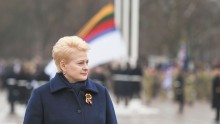Lithuanian President Dalia Grybauskaite has consistently and unequivocally spoken in support of Ukraine. In 2014, she became the first European leader to openly speak about the Russian aggression in the Donbas and the annexation of Crimea. In addition, she said bluntly in an interview with The Washington Post that she saw both the Islamic State (IS) and the Russian Federation (RF) as terrorists. “Russia is terrorizing its neighbors and using terrorist methods,” the Lithuanian leader was quoted as saying by the newspaper.
Meanwhile, after the terrorist attacks in Paris, French President Francois Hollande and some other leaders began to talk about the need to include Russia in a broad coalition against the IS. However, not everyone in the EU subscribes to the proposal, noting that the RF itself is an exporter of terrorism and has violated all international norms by annexing Crimea and continuing aggression in the east of Ukraine.
At a meeting with the presidents of Latvia and Estonia, Grybauskaite said that Lithuania “will not be participating in any new coalitions that Russia is or wants to be a part of.” “Russia still occupies the territory of one country and is carrying out direct military actions in another, even two countries – Georgia and Ukraine,” Grybauskaite noted.
In his turn, Estonian President Toomas Hendrik Ilves called Russia an aggressor. “I have doubts about any coalition that would involve an aggressor like our neighbor,” he concluded.
Meanwhile, leader of Latvia Raimonds Vejonis stressed that the situation in the EU and on its southern borders should not distract attention from Ukraine, Delfi reports. “Our common task is to keep the issue of Ukraine high on the EU agenda until the full resolution of the Minsk Agreements,” he said.
COMMENTARIES
Marius LAURINAVICIUS, Senior Fellow-in-Residence, Center for European Policy Analysis (Washington):
“Statement by the president of Lithuania can significantly affect the position of the EU, which operates on the principle of consensus. The same applies to the sanctions. However, it is possible that countries such as France will start cooperating with Russia. Lithuania opposes it.
“The statement made by Grybauskaite reflects consistent policy of Lithuania. Our president and other Lithuanian politicians have repeatedly used these words. This is our mission, to awaken Western countries. Yes, we must fight together against international terrorism, but Russia cannot be a partner in this fight. Russia itself often acts as a terrorist state. Grybauskaite said this much as well.
“In the West, there is a lot of misunderstanding of what Russia is doing. What happened in Paris played strongly into the hands of the RF. After all, Russia announced immediately after the terrorist attacks in Paris that it had investigated the causes of the catastrophe of its aircraft in Egypt and stated that we had to work together to fight terrorism. It is evidence that Russia was prepared for this.”
Zaneta OZOLINA, political scientist, professor, University of Latvia (Riga):
“The Baltic States remember about Russian ambitions in Ukraine and the occupation of Crimea, and this makes cooperation with Russia a very complicated affair. Syria is a platform where different interests collide. European countries have two options: to ignore Russia (this will exacerbate the conflict in Syria), or to try and look for ways to make negotiations with the Kremlin over Syria possible (I do not want even talk about an alliance with Russia).
“Ukraine, unfortunately, is not a major player in such anti-terrorist operations. Of course, the Baltic States, Poland, and the US will not abandon Ukraine. At the same time, a strictly Eurocentric approach could harm European security, as well as the transformation processes inside Ukraine. Now Ukraine can focus more on its reforms and accelerate them, knowing that Russia cannot fight on all fronts at the same time. Ukraine should play a more active role in its own transformation.”







